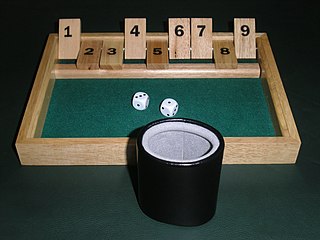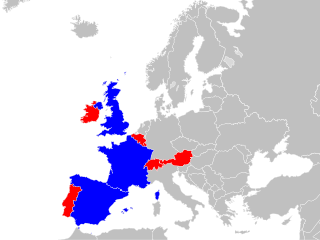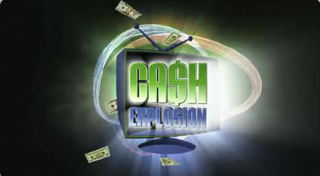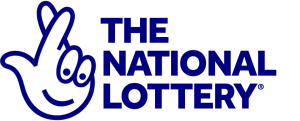
Craps is a dice game in which players bet on the outcomes of the roll of a pair of dice. Players can wager money against each other or against a bank. Because it requires little equipment, "street craps" can be played in informal settings. While shooting craps, players may use slang terminology to place bets and actions.

Monopoly is a multiplayer economics-themed board game. In the game, players roll two dice to move around the game board, buying and trading properties and developing them with houses and hotels. Players collect rent from their opponents and aim to drive them into bankruptcy. Money can also be gained or lost through Chance and Community Chest cards and tax squares. Players receive a salary every time they pass "Go" and can end up in jail, from which they cannot move until they have met one of three conditions. House rules, hundreds of different editions, many spin-offs, and related media exist. Monopoly has become a part of international popular culture, having been licensed locally in more than 113 countries and printed in more than 46 languages. As of 2015, it was estimated that the game had sold 275 million copies worldwide. The original game was based on locations in Atlantic City, New Jersey, United States with the exception of Marven Gardens, which is in adjacent Ventnor, NJ.

Pay Day is a board game originally made by Parker Brothers in 1974. It was invented by Paul J. Gruen of West Newbury, Massachusetts, United States, one of the era's top board game designers, and his brother-in-law Charles C. Bailey. It was Gruen's most successful game, outselling Monopoly in its first production year. Pay Day is currently marketed by Winning Moves Games USA.

Shut the box is a game of dice for one or more players, commonly played in a group of two to four for stakes. Traditionally, a counting box is used with tiles numbered 1 to 9 where each can be covered with a hinged or sliding mechanism, though the game can be played with only a pair of dice, pen, and paper. Variations exist where the box has 10 or 12 tiles.

SolarQuest is a space-age real estate trading board game published in 1985 and developed by Valen Brost, who conceived the idea in 1976. The game is patterned after Monopoly, but it replaces pewter tokens with rocket ships and hotels with metallic fuel stations. Players travel around the Sun acquiring monopolies of planets, moons, and man-made space structures. They seek to knock their opponents out of the game through bankruptcy, as well as optional laser blasts and dwindling fuel supplies.

The Pennsylvania Lottery is a lottery operated by the Commonwealth of Pennsylvania. It was created by the Pennsylvania General Assembly on August 26, 1971; two months later, Henry Kaplan was appointed as its first executive director. The Pennsylvania Lottery sold its first tickets on March 7, 1972 and drew its first numbers on March 15, 1972.

High Rollers is an American television game show that involved contestants trying to win prizes by rolling dice. The format was based on the dice game shut the box.

The California State Lottery began in October 1985 after voters authorized it in Proposition 37, the California State Lottery Act of 1984. It offers a range of games including number draws, scratchcards and a mock horse race. The earnings provide supplementary funding for public education.

EuroMillions is a transnational lottery that requires seven correct numbers to win the jackpot, which consists of 5 main numbers and 2 Lucky Star Numbers. It was launched on 7 February 2004 by France's Française des Jeux, Spain's Loterías y Apuestas del Estado and the United Kingdom's Camelot. The first draw was held on 13 February 2004 in Paris. Initially, only the UK, France and Spain participated, with the Austrian, Belgian, Irish, Luxembourgish, Portuguese and Swiss lotteries joining for the 8 October 2004 draw.

A scratchcard is a card designed for competitions, often made of thin cardstock or plastic to conceal PINs, where one or more areas contain concealed information which can be revealed by scratching off an opaque covering.
The Montana Lottery is run by the government of Montana. It is a member of the Multi-State Lottery Association (MUSL). The Montana Lottery's portfolio consists of scratch tickets, plus Mega Millions, Powerball, Lotto America, Montana Millionaire, Lucky for Life, Big Sky Bonus, Montana Sports Action, Treasure Play and Montana Cash.
The Virginia Lottery is an independent agency of the Commonwealth of Virginia. It was created in 1987 when Virginians voted in a statewide referendum in favor of a state lottery. The first ticket was sold on September 20, 1988. All profits from Virginia Lottery ticket sales go to K-12 public education, as required by Virginia's constitution. In Fiscal Year 2023, the Lottery's profits totaled more than $867.4 million, accounting for approximately 10 percent of school funding in Virginia. That brought total Lottery profits in Virginia to more than $15.5 billion.

Cash Explosion, known as Cash Explosion: Double Play from 1989 until 2012, is the official Ohio Lottery TV game show, which is broadcast on television stations throughout Ohio. The show originated in Cleveland and is now taped by Mills James Productions in Columbus, Ohio.

Fable II Pub Games is an Xbox Live Arcade title that includes three pub game-styled minigames called Keystone, Fortune's Tower and Spinnerbox for the Xbox 360, developed by Carbonated Games under the supervision of Lionhead Studios, which all share functionality with Fable II. The games are included in both editions of Fable II. Fable II Pub Games was free for those who pre-ordered Fable II from participating retailers.

The National Lottery is operated by ITHUBA Holdings, to whom the licence was granted in 2015. The lottery is regulated by the National Lottery Commission, and was established in 2000.

The National Lottery is the state-franchised national lottery established in 1994 in the United Kingdom. It is regulated by the Gambling Commission, and is currently operated by Allwyn Entertainment Ltd, who took over from Camelot Group on 1 February 2024.

Monopoly: The Mega Edition is a special variant of the popular board game Monopoly. The game was first published on May 22, 2006 by Winning Moves Games USA in the USA. A UK version was adapted on October 1, 2007.

The National Lottery is the state-licensed lottery of the Republic of Ireland. Established in 1986 to raise funds for good causes, it began operations on 23 March 1987 when it sold its first scratchcards. It launched the weekly drawing game Lotto the following year, holding the first draw on 16 April 1988. It now offers EuroDreams draws on Mondays and Thursdays, EuroMillions and Plus draws on Tuesdays and Fridays, Lotto and Lotto Plus draws on Wednesdays and Saturdays, and two Daily Million draws each day. Its other games include televised bingo, an annual Millionaire Raffle, and online instant-win games. The minimum age to play all National Lottery games is 18.

Monopoly Millionaires' Club (MMC) was a series of 16 scratchcard games that differed by its participating lotteries; its players could become eligible to be flown to Las Vegas to take part in an episode of the Monopoly Millionaires′ Club game show
Tombola is a lottery-style board game which originated in Southern Italy. A variation of the game is a popular form of raffle in the UK and elsewhere around the world.

















